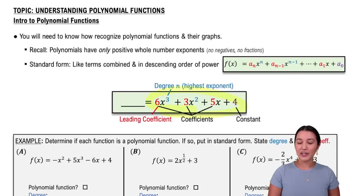Composition of even and odd functions from tables Assume ƒ is an even function, g is an odd function, and both are defined at 0. Use the (incomplete) table to evaluate the given compositions. <IMAGE>
c. ƒ(g(-3))
 Verified step by step guidance
Verified step by step guidance Verified video answer for a similar problem:
Verified video answer for a similar problem:



 5:56m
5:56mMaster Adding & Subtracting Functions with a bite sized video explanation from Patrick
Start learning